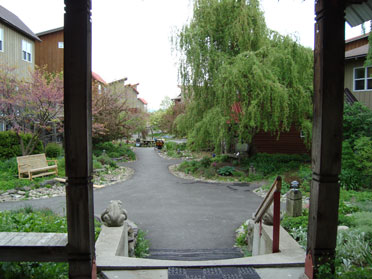ECOVILLAGES

WHAT IS AN ECOVILLAGE
What exactly is an ecovillage? This is probably something you are asking yourself right now. Not all ecovillages are co-housing communitites. They each have their own intentions and concerns regarding the construction of their homes. However those living in an “ecovillage” are more concerned completing this in an eco-friendly manner and living in this sort of environment. In other words, ecovillages are intentional communities established with the purpose of providing a more socially, economically, and ecologically sustainable environment. They have begun to develop all around the world and vary in many different aspects. The motivation for this develops with the intention of bettering our way of living to more efficiently preserve our planet and all of the resources available. From wealthy to poor, different regions around the world have their own particular needs, resources and potential and while they often vary in size, they all look to support the environment with a low impact way of life. They use similar methods towards becoming more environmentally friendly and share commitment to sustainable living. However many remain at different stages in their development progress. Ecovillages as a whole have become an important solution to a major problem of our time.
ENVIRONMENT EFFICIENCY TACTICS
EcoVillages are often sought out for the community setting or the eco-friendly environment. They choose an alternative to centralized electrical, water, and sewage systems. Different regions use different tactics but all are searching for a sustainable habitat able to provide for most of their needs on site. Rural and urban landscapes differ in their alternative agriculture solutions. Rural sites make use of permaculture, medicinal herb gardens, and farms with minimal fossil fuel dependency. Urban sites on the other hand use communal gardens that help support food co-op in surrounding neighborhoods. Ecovillages aim to minimize energy consumption using alternative building techniques along with fitting the buildings with solar and windpower, essentially operating “off the grid.” Other methods of composting waste and using “green machines” or aquaculture to treat their grey water also prove to be efficient in these settings. Any sort of composting, energy monitoring, reuse and recycling are extremely important.
BENEFITS OF AN ECOVILLAGE
In addition to being environmentally efficient, ecovillages have other benefits as well. People are able to easily create social bonds with one another while they are present in this sort of close community setting. Also, the values they are working towards are passed on and taught to the children of the village. They too are then able to hold these morals and values in their growth. As mentioned prior to this, the centralized sustainable electricity, water, gardening and sewage or grey water systems are put into place in an eco-friendly way having a positive impact on the environment and the people living there. Living in an ecovillage can also allow the members to control the different foods grown and they way they are processed and stored. Other benefits lie within green building practices using climate and terrain to their advantage. There are some benefits that don’t apply as closely to the environment but to the close community setting. These include centralized jobs within the community, lower monthly expenditures due to shared costs, and the absence of loneliness. EcoVillages, once developed, are available for new generations to come and become a success in changing the way we live.

CHALLENGES
There are challenges involved in developing an ecovillage. The initial issue that is often come across is not having enough funding for the projects. This is one major setback that people run into in their attempts to start an ecovillage. Another issue involves working within the legal system as there are regulations with alternative energy conservation and building codes on certain lands and areas. There is a need for a growing population, as the community does not just need money and land put also the power and strength to support this growth. The entire process takes a great deal of time and patience. Within the community there have to be agreements and this is where the decision making process can produce conflicts. Some communities resort to census decision making but others use different methods that sometimes may or may not be efficient or effective enough. However at the end of the day many may decide that the rewards they receive out of this whole project are much greater and well worth the obstacles they may have to overcome to get there.